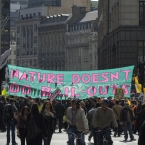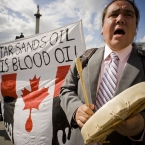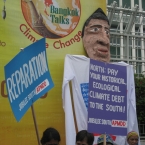Acting Up for Climate Change
I was a bit puzzled earlier this month when the new intern in our office - a conscientious sort - didn't show up to work all week. It all made sense when I finally got a call from her saying that she had just gotten out of police custody after having spent two nights camped high up on a smoke stack on a coal-fired power station in Oxford. As far as not coming to work excuses go, it's pretty water-tight.
It's been a busy year for climate activists around the world. Where I live, in the UK, we've seen actions ranging from thousands of people camping outside the European Climate Exchange in the heart of the financial district of London to protest carbon trading during the G20, to the "Great Climate Swoop" on October 17 which saw some 800 activists invading one of the biggest coal-fired plants in the country. Our dazzling array of imaginative actions have included mass trespass, lock-ons, fence cutting, office occupations, blockades, runway invasions, a flotilla of homemade rafts laying siege to a power station and many, many people Super-Gluing themselves to pretty much anything and everything within reach.
It's not just a question of trying to grab headlines - although a certain degree of media savvyness has played an important role. In the village of Sipson, where a thousand families stood to lose their homes in order to build a third runway at Heathrow Airport, a speed dating service had hooked up local residents with affinity groups in order to start developing strategies and structures so as to resist eviction attempts when they started happening. Activists had expressed a commitment to physically intervene if and when the bulldozers rolled in.
The UK climate movement's successes this year are just one small part of global efforts beginning to see broader recognition of the issues. A whole host of inspiring and crucial struggles are taking place in Southern countries that don't necessarily self-identify as being about climate direct action but that are of key importance in the fight for climate justice - such as the indigenous communities in the Peruvian Amazon fighting to resist the expansion of oil companies, and the organizing efforts of peasant communities the world over struggling for the right to maintain existing low-carbon livelihoods.
With Copenhagen appearing doomed to agree on anything that would begin to meaningfully address the threat of climate change, and with governments the world over failing to stem the tide of new carbon-intensive infrastructure, there is a clear role for mass civil disobedience and targeted direct action to play in oiling the wheels of the transition to a low carbon future. In the UK, like many countries around the world, communities and concerned citizens are starting to take matters into the own hands out of frustration at the failure of governments to take action.






